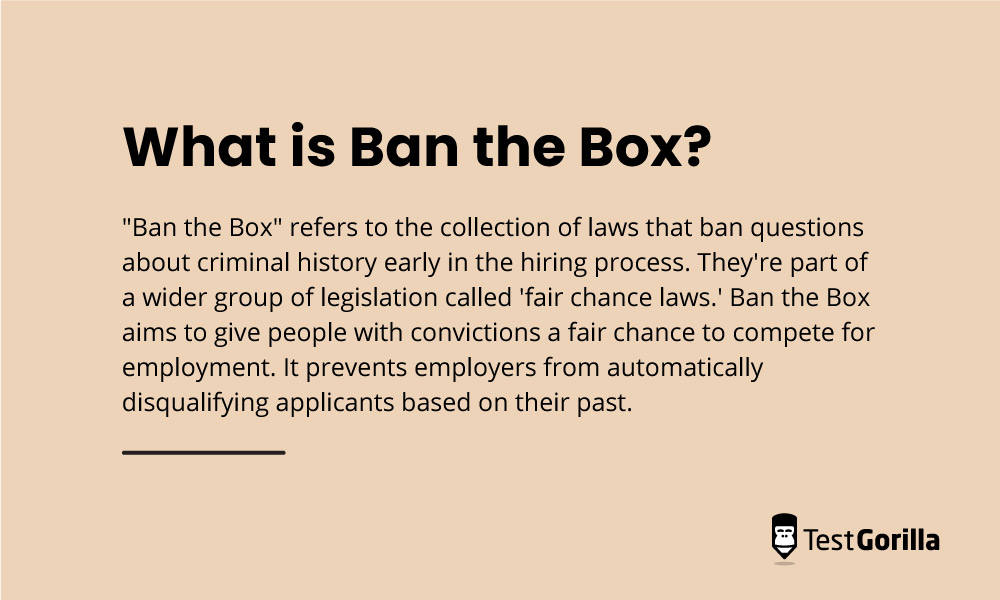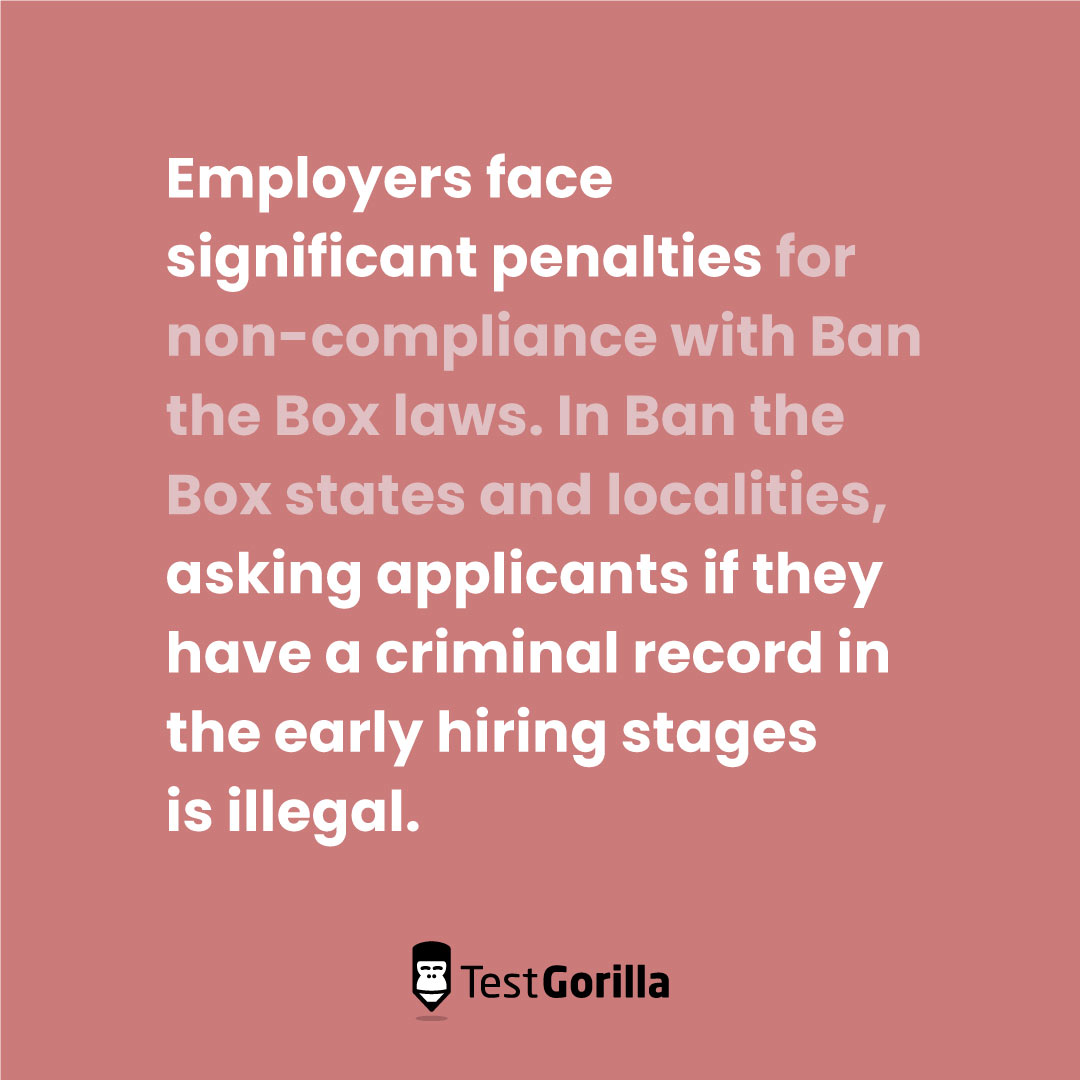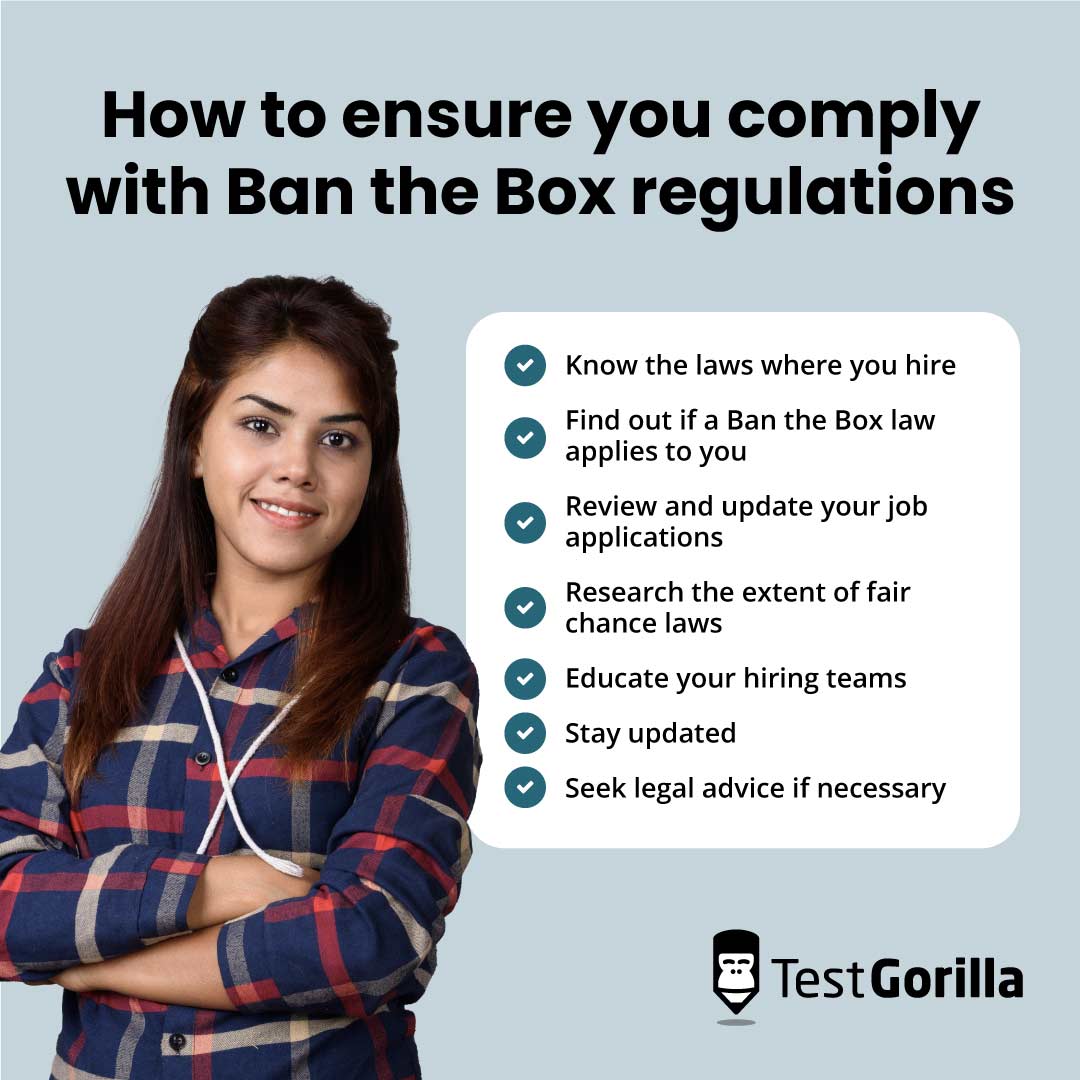Ban the Box laws prohibit employers from asking about criminal convictions and arrests on job applications. These laws vary from state to state, across counties and cities, so it can be tricky to know exactly what to do to comply. It's also a rapidly changing area of law, with considerable efforts being made to pass legislation on a national scale.
You can face hefty fines if you have unfair hiring practices that violate any Ban the Box requirements.
This guide explores what Ban the Box means for employers, what states it affects, and how to ensure your hiring practices remain compliant.
What is Ban the Box?
"Ban the Box" refers to the collection of laws that ban questions about criminal history early in the hiring process. They're part of a wider group of legislation called 'fair chance laws.'
Ban the Box aims to give people with convictions a fair chance to compete for employment. It prevents employers from automatically disqualifying applicants based on their past.
While some fair-chance hiring laws apply to later stages of recruitment, Ban the Box laws only affect the initial steps of the process. It requires the removal of checkboxes and questions about prior arrests and convictions on job applications. However, some positions are exempt from these laws. For example, if the job involves working with children.
Currently, 37 states, Washington DC, and 150+ counties and cities enforce Ban the Box hiring policies.
The Ban the Box campaign
Ban the Box can also refer to the campaign that promotes this legislation and other fair hiring practices. The Ban the Box campaign is an ongoing movement, and supporters aim to extend laws nationwide. So, it's essential to understand Ban the Box regulations even if they don't currently affect you.
Why is Ban the Box important?
Supporters believe banning the box is important because it promotes equal opportunities. Asking about criminal history early in the hiring process creates a barrier for people with prior convictions. Considering this later in the hiring process allows candidates to be evaluated only on their skills at this stage.
Ban the Box supporters believe this practice brings several benefits.
Employers can access a larger pool of talent
An estimated 70,000,000 adults in the US have an arrest or conviction history. Many of these people have valuable skills and experience. By banning the box, employers gain access to a broader talent pool, which is beneficial for remaining competitive.
It reduces reoffending
If you don't automatically disqualify job seekers with a record, they have a much better chance of becoming employed. They can reintegrate into society, achieve stability, and reduce their likelihood of reoffending.
It helps communities
Ban the Box policies help create safer communities by reducing unemployment rates and lowering crime. Having more of the working-age population in employment has economic benefits too.
The best insights on HR and recruitment, delivered to your inbox.
Biweekly updates. No spam. Unsubscribe any time.
Criticisms of Ban the Box
Critics argue that Ban the Box policies fall short in significant areas.
It doesn't provide fairer chances
Ban the Box policies don't give those it seeks to help a better chance. Employers still find out about job seekers' criminal history – at a later stage of the process. An employer that's against hiring ex-offenders isn't likely to hire them just because they learn of their record further down the line.
It increases racial discrimination
Studies have found that Ban the Box laws increase racism. The US disproportionately incarcerates people of color, especially black and Hispanic men. Some employers automatically assume minority applicants have a criminal record and discriminate against them.
Ban the Box laws are complicated
The complexity of Ban the Box legislation across the US makes it difficult for employers to comply. It can be especially difficult for organizations operating in multiple states because they have to navigate a patchwork of different regulations.
What does Ban the Box mean for employers?
Employers face significant penalties for non-compliance with Ban the Box laws.
In Ban the Box states and localities, asking applicants if they have a criminal record in the early hiring stages is illegal.
Questions about criminal convictions must be removed from job applications to avoid violations. But complying isn't as simple as knowing whether or not you're in a Ban the Box area.
Variations in Ban the Box laws across the country include:
Which employers must abide by the regulations
The types of jobs that regulations cover
Which positions and organizations are exempt
When employers can inquire about criminal history
What employers can do with disclosed information
Which employers does Ban the Box affect?
Ban the Box laws primarily affect the public sector. This means that in many locations, only public-sector employers have to follow them. However, 15 states have extended their Ban the Box laws to include private employers.
States with laws or policies that affect public-sector employment only
Arizona
Delaware
Georgia
Indiana
Kansas
Kentucky
Louisiana
Michigan
Missouri
Nebraska
Nevada
New Hampshire
New York
North Carolina
North Dakota
Ohio
Oklahoma
Pennsylvania
Tennessee
Utah
Virginia
Wisconsin
States with laws or policies that affect public-sector and private employment
California
Colorado
Connecticut
Hawaii
Illinois
Maine
Maryland
Massachusetts
Minnesota
New Jersey
New Mexico
Oregon
Rhode Island
Vermont
Washington
Adhering to Ban the Box in your hiring process
While most Ban the Box laws affect public sector employers, more states are passing legislation that impacts private employers.
Here's how to ensure your organization's hiring practices comply with Ban the Box regulations.
Know the laws where you hire
First, you need to know the current Ban the Box laws where your hiring takes place. You need to be specific and check the regulations for each state, city, and county. This is vital because differences in legislation can change drastically within a single state.
For example, in New York state, Ban the Box laws only apply to public sector employers. But New York City has a separate law that applies to all public and private employers with four or more employees.
Find out if a Ban the Box law applies to you
Many regulations only impact a private organization when it meets specific criteria – such as having a minimum number of employees. So, your next step should be determining whether there are laws that apply to your circumstances.
Check if any local, state, or federal law provides an exemption. This is common for positions that involve working with vulnerable populations. But it can apply to other jobs – such as financial advisors.
Review and update your job applications
Review your job applications to ensure compliance if a Ban the Box law applies to your hiring practices. Remove any checkbox or question that violates Ban the Box legislation. This includes any inquiry into criminal convictions, imprisonments, or arrest history. In most cases, you should remove any references to criminal history or background checks from job descriptions.
Research the extent of fair chance laws
Ban the Box laws are part of a broader movement toward fairer hiring practices, so they often come hand-in-hand with other fair chance laws. These can vary even more than Ban the Box laws across state, county, and city legislation.
Fair chance laws typically regulate:
When employers can ask about applicants' criminal history
When employers can run a background check
How employers can consider applicants' criminal history
Whether employers can take older convictions, minor offenses, and unrelated offenses into consideration
The process of denying employment due to criminal history
If you're bound by fair chance laws that go beyond Ban the Box, you may have to adjust other aspects of your hiring practices to ensure compliance.
Educate your hiring teams
Non-compliance with Ban the Box and other fair chance laws is serious, so your team must be clear on the rules. Employee training highlights the importance of adhering to regulations and clarifies any confusion. It also helps to avoid unfair hiring practices and potential legal consequences.
Stay updated
Ban the Box legislation is relatively new and controversial. Because of this, it’s likely to continue evolving. A change could make your hiring process non-compliant, so keeping on top of developments is essential. The best idea is to implement a strategy to stay informed of any law changes affecting your practices.
Seek legal advice if necessary
Ban the Box and fair chance laws are complex, so it's wise to get legal advice. This can be especially beneficial for organizations that follow regulations across multiple regions. An employment law attorney can advise on your situation and help ensure your hiring practices are compliant.
Ensure fair hiring practices with skills-based hiring
While Ban the Box laws are well-intentioned, employers need more consistency. But ignorance of the law is no defense. You'll be liable for penalties if you break Ban the Box regulations.
Taking a skills-first approach helps you stay on the right side of the law. It prioritizes candidates’ abilities rather than bias-prone factors such as prior convictions.
TestGorilla makes adopting skills-based hiring practices in your organization easy. As long as you don't add criminal history questions, candidate testing provides a simple and effective way to comply with Ban the Box laws.
Learn more about optimizing your hiring practices by signing up for a free 30-minute live demo. Or try TestGorilla's Free Plan and get instant access to 10 popular tests and explore the premium features in your own time.
You've scrolled this far
Why not try TestGorilla for free, and see what happens when you put skills first.

















